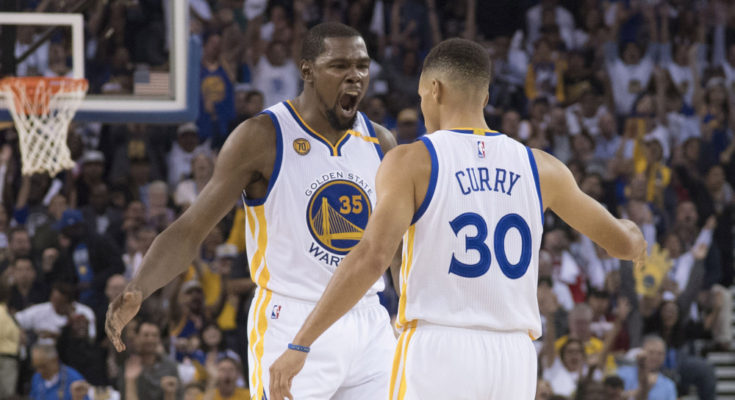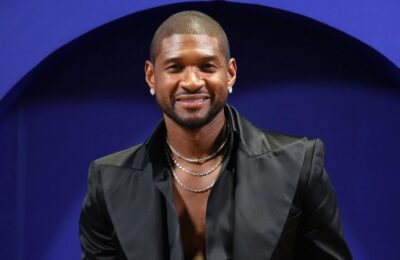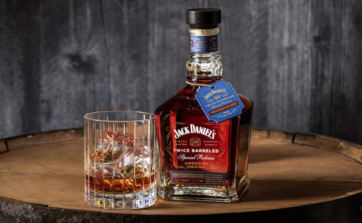Kevin Durant violated the unwritten NBA code of alpha leaders when he signed on with the Golden State Warriors. His critics practically suggested he had unmanned himself by wanting to play for a ready-made franchise with talent equal to his own. The offense was right up there with ironing his boxer shorts. Maybe he can toughen up by getting a dollar shave or eating some ribs. Maybe with a couple of more 33-point, 13-rebound, six-assist, five-block, three-steal performances against the Cleveland Cavaliers he can apply for Man Amnesty.
If nothing else happens in these NBA Finals, Durant and the Warriors have dispensed with the wrongheaded old attitude that to qualify for full Male Authorization you have to show you can carry a team alone. With every manhandling of an opponent in this postseason, Durant’s critics look sillier and sillier for suggesting that it was “weak” for him to sign on with Steph Curry, Draymond Green and Klay Thompson, after they had beaten him in the Western Conference finals last year with Oklahoma City.
“He lost and then he joined,” Doc Rivers said accusingly. “It’s something from a competitive standpoint, you would think you wouldn’t do.” Paul Pierce likened it to getting “beat up by the bully’s gang and now I want to join your gang.”
At what point in the history of Mr. Naismith’s game did it become the wrong thing to play well with others? At what point did it become a crime against posterity to seek help and share credit?
It’s hard to precisely date the point at which point NBAers decided that too little ego was not properly muscular. But it seems to have started sometime between the Atomic Age and the Information Age, or when Michael Jordan dropped 69 points on Cleveland in 1990, and Kobe Bryant bombed Toronto with 81 in 2006. Somewhere in there, the ethos shifted. People forgot that Willis Reed, Earl Monroe, Bill Bradley, Walt Frazier and Dave DeBusschere coexisted quite beautifully on the New York Knicks without losing their stud identification papers. All of a sudden Phil Jackson was writing leadership-genius books about the epic, pranic quest to persuade Jordan and Bryant to grudgingly accept the company of Scottie Pippen and Shaquille O’Neal.
A great’s legacy began to depend on his ability to overshadow his teammates. Remember what Orlando general manager Otis Smith said after LeBron James decided to play with Dwyane Wade and Chris Bosh in Miami? “I thought he was, I guess, more of a competitor,” Smith said. Jordan implied it was the mark of a softer generation, declaring he never would have shared a floor with Larry Bird or Magic. “I was trying to beat those guys,” he said. Charles Barkley went so far as to suggest James had damaged his reputation in perpetuity, and shouldn’t be considered in the same category as a greatest-ever. “This clearly takes him out of the conversation.”
But that paled compared to the heat Durant took for leaving Oklahoma after eight championship-less years to join the Warriors, a franchise that already had an MVP in Curry and won a title in 2015. Barkley charged Durant with seeking to “gravy train.” ESPN’s Stephen A. Smith flatly called it “the weakest move I’ve ever seen by any superstar in any sport.”
What a bunch of donkey-headed braying.
So, to recap: Sharing is weak, chemistry is a gravy train and unselfishness is failing to stand up for yourself.
This notion that Durant did the wrong, unmanly thing, that he overstocked the Warriors with too much talent and thus it would take some meaning away from any title he wins, is nonsense. Across the floor, Cleveland has James, Kyrie Irving, Kevin Love and J.R. Smith. Exactly what did Durant’s critics expect him to do, nobly concede his entire career to that crew? Durant has just one rival when it comes to the combination of individual brilliance and willingness to share, and it’s James, who is likely to lead the Cavaliers to a strong counterpunch before the series is over.
Here’s the deal: If the series ends with a victory for Durant, he will have established himself as one of the truest greats of his age. But just as important, he will have restored honor to the art of collaboration. As the Warriors have taken a 2-0 lead in these Finals, Durant has shown us that he wasn’t just after a ring, he was after a certain ethic. He had his choice of “gravy trains” in free agency last season. He could have been a potential ring-maker in Boston, San Antonio or Miami. But he chose the Warriors because of the way “they practically held hands” as teammates, and because “they just really enjoy pure basketball,” he said. “That’s the kind of feel that I wanted.”
Pure. The word is as good a description as any of the way the Warriors have swept through the postseason without dropping a game. They have such a well-practiced sense for each other’s braiding movement, and such charitable openhanded passing that it seems almost intuitive. They combine it with such active, harrying help-defense that it looks like opponents are trying to shoot through a cage. They’ve got the top defensive rating, the top assist ratio, and the top assist to turnover ratio in the NBA. As it turns out, Durant’s powerful hydraulic grace was the perfect complement to them, a finishing piece. Listen to this: in Game 1 of the Finals they had 31 assists on 45 field goals. In Game 2 they had 34 assists on 46. Who plays that way? Nobody.
That’s not a gravy train or craven ring-seeking on sheer talent. That’s the beau ideal of the game, five people thinking and feeling as one, the way it’s meant to be played. The only way basketball looks this pretty is if you work so hard at it, with such common dedication to craft, and such a wholly absorbed and internalized unselfishness, that it becomes magic.
One of the people who recognizes that is Spurs Coach Gregg Popovich. “They are really talented, but that’s not the whole equation,” he said after San Antonio was swept in the conference finals. “That’s not everything that describes them. This is, you know, maybe the best defensive team in the league on top of everything. So they don’t just play with talent. . . . On offense, no team is more unselfish finding the open man and that sort of thing. . . . Coaches are always trying to get their team to do that. But they’ve got a multitude of people who are unselfish in that regard and play a beautiful game, and on top of that play D at the other end. So they deserve a lot more credit than, ‘Well, they’re talented. They’re supposed to win.’ That is disrespectful to them in my book. They’re way, way more than just their talent.”
Enough with the disrespect. Enough with the idea that unless you are a puffed up iconoclast who likes to play one on five, you somehow are the weaker player, talent, and man. (WP)









